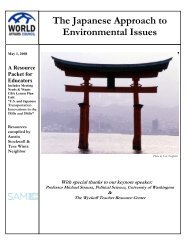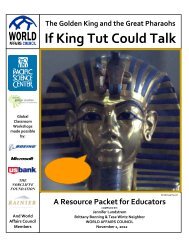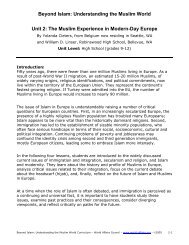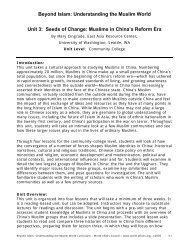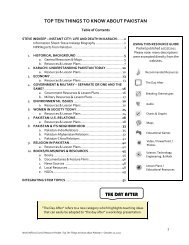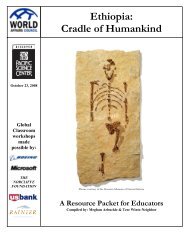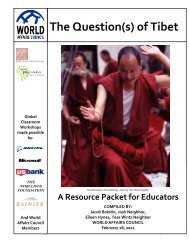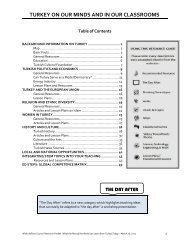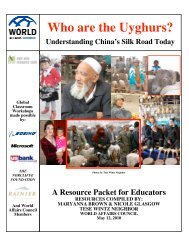Turkish Culture and Society - World Affairs Council
Turkish Culture and Society - World Affairs Council
Turkish Culture and Society - World Affairs Council
Create successful ePaper yourself
Turn your PDF publications into a flip-book with our unique Google optimized e-Paper software.
classroom. The anthology includes stories from Turkey, Israel, Iran, <strong>and</strong> the Arab world, tested <strong>and</strong><br />
selected for their cultural richness <strong>and</strong> their appeal to young adults. It includes units for each story,<br />
extensive background notes, a glossary of Middle Eastern words <strong>and</strong> phrases, <strong>and</strong> a comprehensive<br />
bibliography related to the themes <strong>and</strong> issues in the stories as further reference for teachers <strong>and</strong><br />
students. (Grade 9-12)<br />
PBS: STEREOTYPES - MORE THAN MEETS THE EYE<br />
http://www.pbs.org/wgbh/globalconnections/mideast/educators/types/lesson1.html<br />
In this lesson, students will develop a better underst<strong>and</strong>ing of the concept of stereotyping. They<br />
will think critically about images <strong>and</strong> media that portray the Middle East <strong>and</strong> its inhabitants,<br />
make determinations about the impact of the images on their perceptions, <strong>and</strong> consider ways to<br />
overcome these stereotypes. (Grade Level 9-12)<br />
PBS: GOT WATER?<br />
http://www.pbs.org/wgbh/globalconnections/mideast/educators/resource/lesson2.html<br />
Students will learn that delivering clean, fresh water to citizens around the world involves <strong>and</strong><br />
affects politics, economics, international relations, <strong>and</strong> technology. The lesson focuses on water<br />
issues in Turkey, Syria, <strong>and</strong> Iraq. The ultimate goal is to find a cooperative solution for all three<br />
countries. (Grade Levels 9-12)<br />
XPEDITIONS: THE MIDDLE EAST REGION - FLAGS AND FACTS<br />
http://www.nationalgeographic.com/xpeditions/lessons/01/gk2/iraqmap.html<br />
In this lesson, students will learn basic facts about the Middle East by exploring maps of the<br />
region. They will use National Geographic's Hot Spot: Iraq website to practice basic map skills by<br />
reading maps <strong>and</strong> drawing their own. Finally, they will learn basic information about the<br />
countries on their maps <strong>and</strong> label that information on their own maps, comparing what they<br />
have learned about the geography of the Middle East with the geography of the United States.<br />
(Grade Levels K-2)<br />
XPEDITIONS: OIL AND WATER IN THE MIDDLE EAST REGION<br />
http://www.nationalgeographic.com/xpeditions/lessons/01/g68/iraqoil.html<br />
In this lesson, students will explore the roles of oil <strong>and</strong> water in the Middle East. Students will use<br />
maps to look at the distribution of oil in the Middle East <strong>and</strong> discuss what it means for the<br />
different countries in the region. They will also examine how water has influenced the region<br />
historically (in the "fertile crescent" region between the Tigris <strong>and</strong> Euphrates rivers) <strong>and</strong> politically<br />
(for example, how Iraq's access to water is limited to one small part of its border). Finally, they will<br />
study specific aspects of Iraq's struggles with water, using satellite imagery to underst<strong>and</strong> <strong>and</strong><br />
illustrate the problem. (Grade Levels 6-8)<br />
UNDERSTANDING THE MIDDLE EAST THROUGH GEOGRAPHY AND<br />
DEMOGRAPHY<br />
http://www.outreachworld.org/resource.asp?curriculumid=285<br />
This lesson plan uses geography <strong>and</strong> demography to examine this important area. Students<br />
learn about the entire region by studying a sub-region in depth through small group,<br />
cooperative learning. Students are divided into six groups <strong>and</strong> each is assigned to a specific<br />
sub-region. They examine geographical <strong>and</strong> statistical data of their sub-region, apply it to the<br />
group's "working map," transfer information to a large class map of the entire area, then<br />
share through collaborative learning. Oil <strong>and</strong> natural gas resources are examined, but<br />
32



